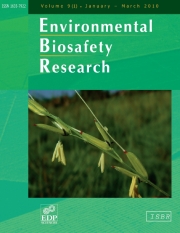Article contents
Swedish farmers attitudes, expectations and fears in relation to growing genetically modified crops
Published online by Cambridge University Press: 20 September 2008
Abstract
This study evaluates a survey about Swedish farmers' attitude towards genetically modified (GM) crops, and their perception concerning potential benefits and drawbacks that cropping of an insect resistant (IR) GM variety would involve. The questions were “tick a box” choices, included in a yearly omnibus survey sent to 1000 Swedish farmers (68% response rate). The results showed that a majority of the farmers were negative, although almost one third claimed to be neutral to GM crops. The farmers recognized several benefits both in terms of agricultural production and for the environment, but they were also highly concerned about the consumers' unwillingness to buy GM products. Farmers perceived an increase in yield, but nearly as many farmers thought that there would be no benefits with growing an IR GM crop. Several differences in hopes and concerns of the farmers surveyed were revealed when they were divided in positive, neutral and negative groups. Farmers negative to GM were more concerned than positive farmers about IR GM crops being dangerous for humans, livestock or other organisms to consume. GM-positive farmers seemed to be most concerned about potential problems with growing a marketable crop and expensive seeds, but saw a reduced health risk to the grower, due to less use of pesticides, as a possible benefit. The results among the GM-neutral farmers were in most cases closely related to the positive farmers' choices, implying that they believe that there are advantages with growing an IR GM crop, but also fear potential drawbacks. This general uncertainty about GM IR crops may prevent them from accepting the new technology.
- Type
- Research Article
- Information
- Copyright
- © ISBR, EDP Sciences, 2008
References
- 8
- Cited by


